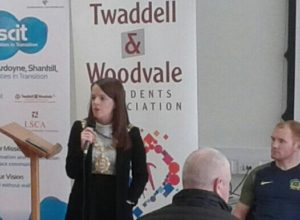Vicky Cosstick, author of Belfast: Toward a City without Walls, reports on the launch of “Promoting Positive Change”, a document from Twaddell Ardoyne Shankill Communities in Transition which records changing attitudes in North Belfast.
There has been a major shift in attitudes in interface areas over the last couple of years, says Elaine Burns of the Ardoyne Association. The North Belfast Advice Partnership, which works across Ardoyne, Ligoniel, Duncairn and Ballysillan, has developed a high degree of trust with its benefit-dependent clients, such that many are happy to access its services in any area. Later this year, when welfare reform and universal credit start, the advice partnership will offer a 5-day a week clinic – one day in each of five centres in North and West Belfast – and “we are confident our clients will not have any hesitation in going into any one of those clinics.”
Burns was speaking at the launch at the Houben Centre on Thursday (22 March), attended by community workers, residents and politicians, of “Promoting Positive Change”, a report based on interviews with 48 residents of North Belfast, commissioned by TASCIT (Twaddell, Ardoyne, Shankill Communities in Transition). The report documents the changes in experience and attitudes of people living in what has been called “a most notorious interface” area, recorded through workshops and interviews. In fact, said Rab McCallum of TASCIT, things are changing, efforts have been made to solve problems through dialogue, and “other places could learn from us”; “We have got to the stage where we are willing to sit down and have hard conversations with each other.”
Researcher Philip Orr noted the “weight of history”, and the “extraordinary love” residents have for their neighbourhoods. The changes are small but significant – people sharing phone numbers and sending Christmas cards, walking their dogs in different directions, feeling comfortable walking through different areas and going to the shops.
The report is testament to the success of the years of work of “cross-community” initiatives, although Eileen Weir of the Shankill Women’s Centre prefers the term “community development” – we have moved beyond “cross-community”, she says. At a session at the Centre on the poppy and the lily, people had realised they didn’t need to change their minds; they just needed to understand and respect one another’s culture better. This was echoed by McCallum, who said: “I’ve worked with people for 20 years and they are still the people they are, but they are more tolerant.” In the face of the failure to restore the Assembly, “leadership is being shown by people on the ground”.
“Promoting Positive Change” consists mostly of unattributed quotes from the residents, showing the change in attitudes through the decades. “My past experience with the other community – I hadn’t got any. None whatsoever. My only experience of the other community is that they would come in and kill somebody or blow somewhere up.” As time went on, there was a new level of engagement between communities, based on “empowering local residents to resolving problems by engaging with those they had previously kept at arm’s length”.
One resident says: “We have to tell our children who we are and what we have suffered. Society says we are bigots and our politicians get the reputation of being bigots. So it’s difficult standing up for your identity. We don’t have to agree with our Catholic neighbours when we meet them but we can agree to disagree.” As time has gone on, there is a growing confidence with change: “We have walls in our own minds, they’re breaking down. That wall coming down in the Crumlin Road was a big start, it made the place look open, less afraid.”

Lord Mayor Nuala McAllister also addressed the meeting and stressed that “if we don’t tackle the problem of poverty, we won’t tackle the problem of division.” These areas figure at the top of lists of Areas of Multiple Deprivation, added Peter Osborne, Chair of the Community Relations Council. There was a recognition that people in all interface areas share the same experience of trauma, poverty and deprivation.
The report makes clear that the physical walls, poverty, and attitudes are all interrelated: “The more we get to know each other, the better things will get, most of the problems we face are the same. Taking the wall away was a great start, it shows confidence and everyone can see that. A lot of people just want to move on and get along together.”
The report “Promoting Positive Change” was funded by the Northern Ireland Executive, Together Building a United Community, and Urban Villages. You can find it here.
